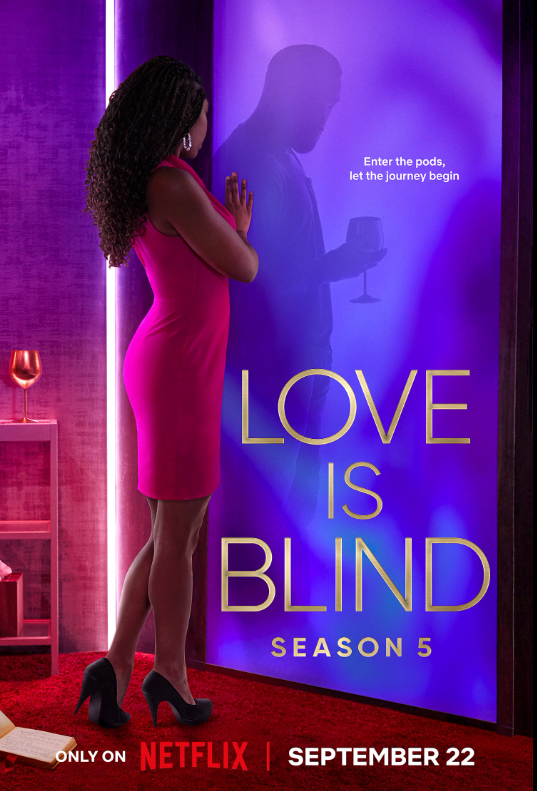Opinion | Dating shows are probably frying our brains


The "Love is Blind" poster.
Like many others, I enjoy consuming the trainwreck that is reality television in search of escapism and mindless entertainment. Dating shows in particular are a subject of much viral conversation and have increased in variety and intensity as the years have gone on. While they are an interesting glimpse into the romantic lives of strangers, dating competitions often exhibit toxic behavior on a large scale and showcase unhealthy representations of relationships.
The very format of these shows places unrealistic expectations on the romantic relationships they claim to foster. By setting extreme time constraints and forcing close proximity to the cast members, they deprive these individuals of genuine experiences in order to manufacture tense situations and drama. While this is what creates entertaining moments for viewers, it also promotes an outlandish and dangerous perception of how to enter relationships. This is only exacerbated when these shows end in “successes” where cast members end up engaged or married by the end of the season, despite this not happening very often.
It is also worth noting that reality dating shows often take on extreme structures. Many promote marriage as the ultimate goal of romantic pursuits, like in “The Bachelor” or “Love is Blind,” which dramatically fast-forward on the important stages of dating and getting to know someone. Another common trope showcases a hypersexualized version of dating, like in “Too Hot to Handle,” which objectifies its contestants by casting only people with very similar body types and referring to them all as “sexed-up singles.”
In “Love is Blind,” the casting directors source conventionally attractive people that conform to the beauty standard and then dramatize their fiancés’ disappointment in their looks or body type — yet they still claim the experiment is blind to physical appearance. This narrative is damaging to viewers and perpetuates impossible standards of attractiveness. Especially amidst a lot of controversy about how they treat the contestants on the show, it is obvious that “Love is Blind” fosters a toxic environment and prioritizes drama over the health of its cast members.
It is also glaringly obvious that reality dating shows skew heavily towards heterosexual relationships. There are very few mainstream dating shows that include any sort of queer representation. One of the only recent examples of this is “The Ultimatum: Queer Love.” While it is a step in the right direction to feature lesbian couples, the show included abusive and toxic moments from some of the cast members with no clear condemnation of that behavior. Netflix continued to invite Mildred Bustillo, who got arrested for domestic violence against fellow cast member Tiff Der, to the reunion episode. This is not only triggering for many, but also an incredibly irresponsible way to portray queer love to millions of viewers.
So why do we — why do I — keep coming back for more?
The drama is a powerful magnet, but we must acknowledge how our collective fascination with these shows can be problematic. Recognizing how this content can shape and warp our perception of relationships is important to maintaining a critical distance and preventing it from seeping further into our lives.
The world of reality dating shows is complex and troublesome. While it is impossible to avoid, and also wildly enjoyable, we have to be mindful of the ways in which we consume these types of media. It is important to prioritize critical thinking and media literacy with these shows. It is also essential to demand more diversity within reality television and work to create more full displays of love and relationships. These shows are not representative of how relationships function in real life, and we must keep this at the forefront of our minds each time we tune in.
Delaney Rauscher Adams is convinced she would win The Bachelor. Reach out to her at dgr17@pitt.edu.
Recent Posts
Therese Pitman: Giving back to Pitt’s student-athletes with equality
Pitman is Pitt’s Director of Student Athlete Development where she helps student-athletes navigate their career…
Pitt speech and debate team heads to nationals
The William Pitt Debating Union, Pitt’s speech and debate team, sends students to both in-person…
Visuals: A Year in Review
The visuals desk had an interesting year. In the midst of the 2024 Presidential Election,…
De-stress events across campus offer students a break from studying
During finals week, departments across campus are offering wellness events to help students manage stress…
Pitt students share their summer plans
After a long and strenuous academic year, many students are excited to take a break.…
Column | Collaboration and connection make us better — yes, even in journalism
Today is the last day I will ever do this, and despite the amount of…